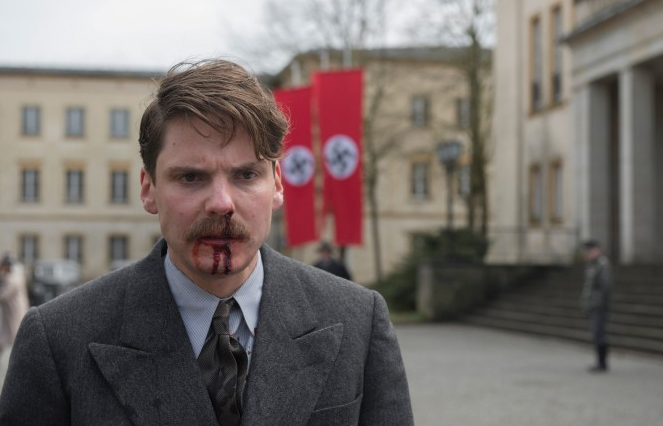

ALONE IN BERLIN (Pérez)
Alone in Berlin, adapted from the novel ‘Every Man Dies Alone’ by Hans Fallada and directed by former actor Vincent Pérez, is about justice, and you best believe that. The film wants you to know this so badly that it goes out of its way to shoehorn into the film a scene in which, one character tells his wife, “I have a mistress whom I obey, and her name is justice.” In another scene, a man proves his son’s involvement in the war by showing a picture of him in uniform in Poland, holding a dead child, as though he’s a trophy hunted on a Safari trip. If these examples pain you with their lack of subtlety, you won’t be delighted to know that they are only two of many, many instances in which the film throws its themes forcefully in your face.
Otto (Brendan Gleeson) and Anna Quangel (Emma Thompson) are a couple living in Berlin during the second world war. The film opens with a battle scene, in which their young son is shot to death on the field. Back in the German capital, to cope with the grief, Otto begins to write small anti-regime postcards, calling for a free press and the downfall of Hitler, and locate them at random places across the city with the help of his wife. As the cards begin to gain more attention in the repressed environment of the time, the Führer gets understandably upset, and Kommissar Escherich (Daniel Brühl) is assigned to find the culprit. [More...]
The distance between such a powerful story about grief and courage, and unintentional comedy is quite long, but the film takes the shortest route by casting non-Germans in the lead roles. An unacceptable practice from a bygone era in Hollywood that refuses to go to the grave, English spoken with a tinge of an accent from mainland Europe as pretend language will never stop being funny – most pronounced in the case of an unfortunately mustachioed Brühl, who is clearly begging to be allowed to speak in his muttersprache. Combined with the flat performances of the film’s star duo – particularly Gleeson, who seems to be phoning his performance in all the way from Ireland – the effect is exasperating and completely distances the audience from the material. Predictable, visually flat and emotionally overcooked, Alone in Berlin is a misfire on every level and an injustice to Fallada’s towering text.
 Darrel Brit-Gibson and Johnny Ortiz at the premiereSOY NERO (Rafi Pitts)
Darrel Brit-Gibson and Johnny Ortiz at the premiereSOY NERO (Rafi Pitts)
Rafi Pitts’s first film made outside of his native Iran tells the story of Nero Maldonado (Johnny Ortiz), a young Mexican boy who dreams of following his older brother’s footsteps across the northern border to obtain American citizenship. He illegally crosses the metal fences that separate the two countries and arrives in LA, at an opulent mansion where his brother ostensibly lives. Nero’s shortest path to obtaining an American green card is serving in the military under the controversial “Dream Act”, but the system is a lot more complex than it appears at first.
Co-written with influential Romanian screenwriter, Răzvan Rădulescu (Child’s Pose, The Death of Mr. Lazarescu), Soy Nero is divided into two halves that differ drastically in setting – the affluent, suburban neighborhoods of Los Angeles and the brutal, barren vistas of battlegrounds in the Middle East. It is in part a satirical take on the illusion of American superiority and exceptionalism, and partially a challenging drama about the difficulties of immigration and the ruthlessness of war. Along the way, Nero meets a strange cast of characters – from a conspiracy theorist Seymour (Michael Harney) to two soldiers who argue about East Coast-West Coast Hip-Hop. Though Soy Nero’s approach to the story is generally absurdist, the consistent tonal shifts and the sparse plotting undermine the audience’s engagement.
This is an interesting addition in the resume of a filmmaker who’s made a career out of stories about desperate heroes fighting against all socio-political odds, but the film never quite settles into rhythm. Particularly problematic is the mismatched tone of the performances who are not equally attuned to the film’s satire. Soy Nero tells a compelling and politically charged story and, like Pitts’s previous film, The Hunter, is visually stunning, but suffers from inconsistent pacing and blunt exposition of its themes.

Previous Berlinale Reviews: Genius, L'Avenir, Being 17, Fire At Sea, Hedi and Midnight Special
